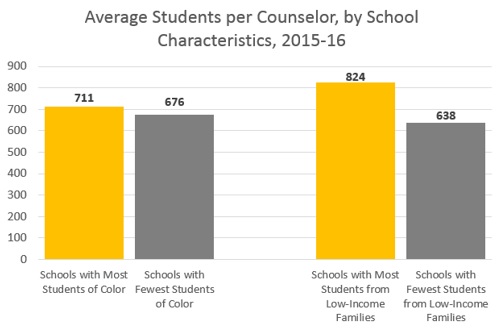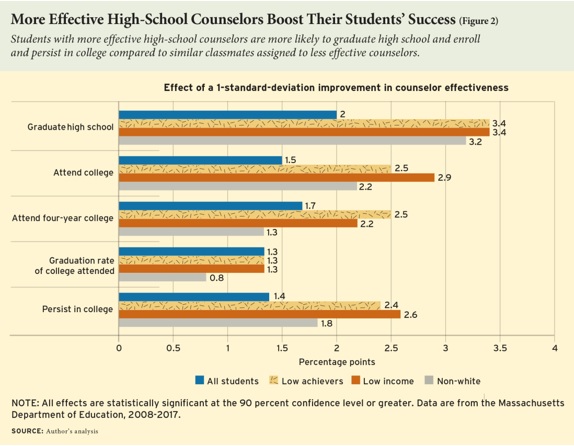The Role Of Teachers As Counselors In Eradicating Students Fears
18th July 2023
Student counseling plays a vital role in shaping students' academic, personal, and social development. In recent years, the recognition of the importance of student counseling has grown significantly. While professional counselors serve as an invaluable resource, teachers also have a crucial role to play in student counseling. Read on to explore the advantages and importance of counseling for students, and learn how to get rid of fear and anxiety in students. Additionally, it also delves into the role of teachers in student counseling, discusses how teachers can serve as student counselors, and concludes with the significance of empowering educators to support students' overall well-being.
Advantages and Importance of Counselling for Students

Source: midwest.edtrust.org
If you wonder why you are supposed to counsel students as a teacher, here are some advantages that students can gain from you:
- Emotional Well-being
Counseling provides a safe space for students to express their feelings, thoughts, and concerns, helping them develop emotional intelligence and resilience.
- Academic Performance
Through counseling, students can address learning difficulties, set goals, and receive guidance to enhance their academic performance.
- Personal Development
Counseling assists students in developing self-awareness, self-confidence, and interpersonal skills, fostering personal growth.
- Social Skills
Counseling equips students with conflict resolution strategies, empathy, and effective communication skills, preparing them for positive social interactions.
- Career Guidance
Counseling helps students explore their interests, aptitudes, and goals, enabling informed decisions about their educational and professional paths.
Hey, do you follow us on Social Media? We regularly share upgraded educational content, tips, feedback and more. Check us out by clicking the profiles here –Facebook / Twitter / LinkedIn / Pinterest / Instagram / YouTube
Traditional Educational System and the Need for Student Counselling

Source: www.educationnext.org
This is why student counseling is needed in traditional educational settings:
- Academic Focus
Traditional education often prioritizes academic achievement over holistic student development, neglecting social and emotional aspects crucial for well-rounded growth.
- Pressures and Challenges
Students face an array of pressures such as high expectations, peer pressure, and societal demands, which can impact their mental health and overall well-being.
- Diverse Student Needs
Every student has unique strengths, challenges, and circumstances, necessitating personalized support to cater to their specific needs.
- Changing Societal Dynamics
Modern society presents new challenges, including technological advancements, cultural diversity, and global connectivity, requiring students to navigate a rapidly evolving world.
Teachers' Role in Student Counselling
Here is how you as an educator can counsel students and help them to achieve personal and professional success:
- Trusted Relationship
Teachers often develop strong relationships with students, built on trust and respect, making them well-positioned to provide support and guidance.
- Daily Interaction
Teachers have frequent interactions with students, enabling them to observe behavioral changes, academic struggles, or signs of distress, prompting timely intervention.
- Holistic Perspective
As educators, teachers have a comprehensive understanding of students' academic progress, strengths, and weaknesses, allowing them to address multiple dimensions of their development.
- Positive Influence
Teachers can serve as role models, inspiring students to overcome challenges, develop values, and cultivate resilience.
How Teachers Can Serve as Student Counsellors
If you are unsure about how to act as students counselors, here are some steps you can take:
- Training and Professional Development
Teachers can receive training and professional development opportunities to enhance their counseling skills, equipping them with effective communication, active listening, and problem-solving techniques.
- Active Listening and Empathy
By actively listening to students' concerns and demonstrating empathy, teachers can create a supportive environment that fosters trust and open communication.
- Identification and Referral
Teachers can identify students who require additional support and collaborate with professional counselors, parents, and administrators to ensure appropriate intervention.
- Mentorship and Guidance
Teachers can guide academic choices, goal setting, time management, and study skills, nurturing students' personal and academic growth.
- Wellness Promotion
Teachers can incorporate well-being activities, mindfulness exercises, and stress management techniques into their classrooms, promoting a positive and healthy learning environment.
Lead A Student To Success
Student counseling plays a crucial role in addressing the diverse needs of students and fostering their overall development. While professional counselors play a significant role, teachers who have completed a Certificate in counseling courses for teachers also have a unique opportunity to contribute to student counseling. Empowering teachers with training, resources, and support can transform education into a holistic journey that equips students with the skills and resilience necessary for success in an ever-changing world.
Find the right course for you and try out the course. Call us now at: 1800-212-6400. You can also mail us at act@asiancollegeofteachers.com.
Written By: Sanjana
Leave a Reply
Recent Posts
- Make Language Learning Fun 5 FunFilling ESL Activities For Teachers To Implement In ESL Classroom
- The Role Of Teachers As Counselors In Eradicating Students Fears
- Achieving Financial Stability For Special Need Parents
- Make Teaching English To Beginners Fun And Engaging With Our 5 Effective Tips
- Achieve A Healthy WorkLife Balance As A Teacher With This Alternative
- Foster A Growth Mindset In Your School Students Teachers And Staff With Proven Strategies


